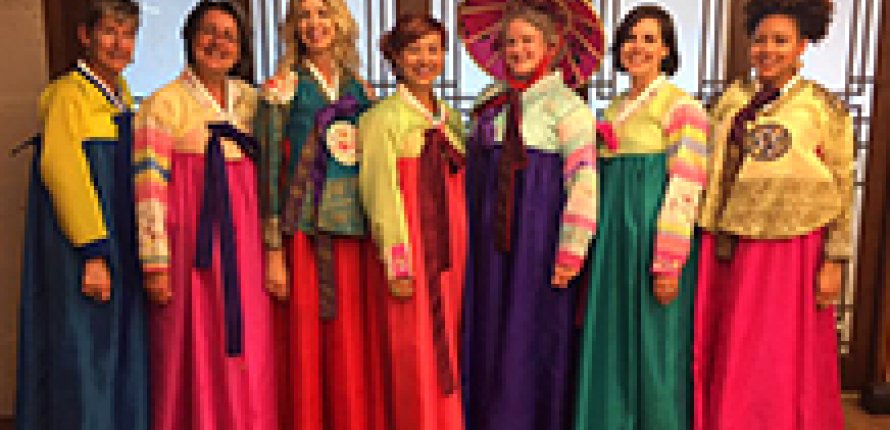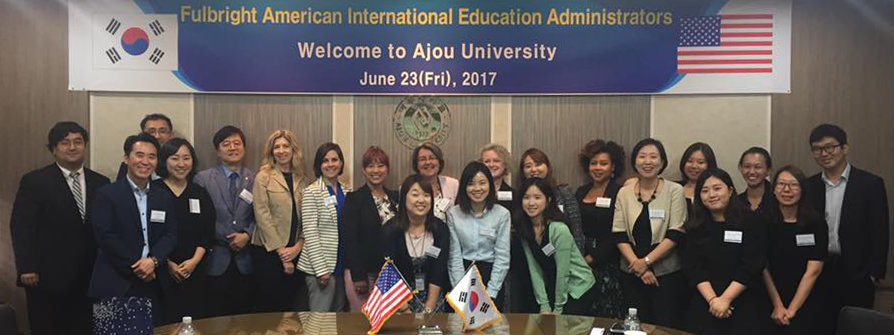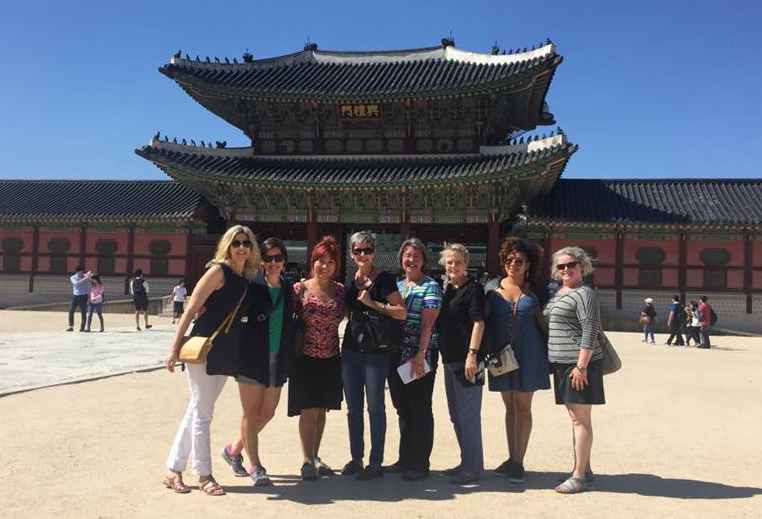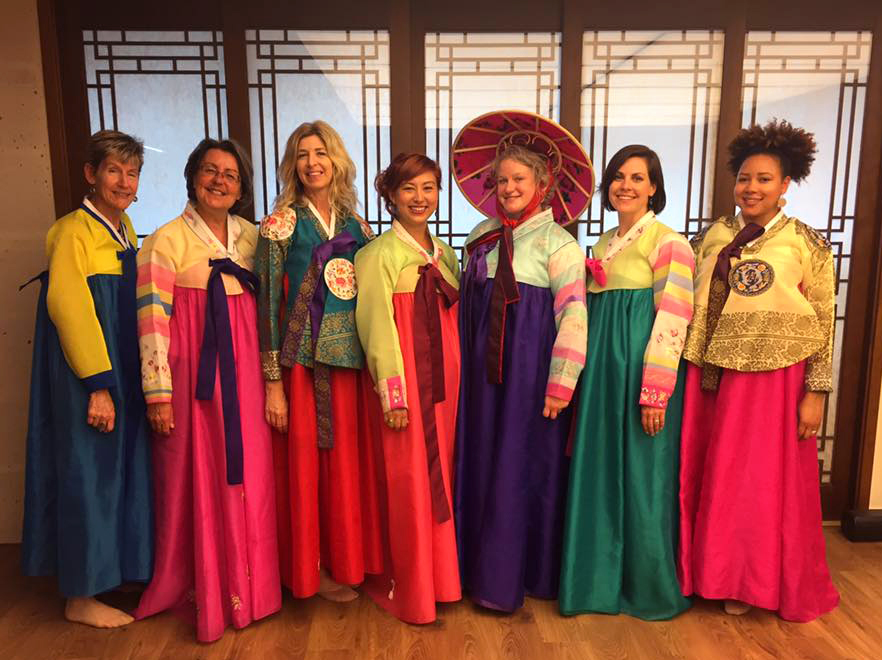Connecting with South Korea on a Fulbright IEA Award

Nancy S. Hyde, Program Coordinator for International Undergraduate Admissions, Utah State University
2017 Fulbright International Education Administrators Seminar to South Korea
On June 11, 2017, eight of us participating in the 2017 Fulbright International Education Administrators (IEA) Seminar in South Korea, arrived at the Inchon Airport, jet lagged but excited to begin our Fulbright experience. We had first met at a Korean barbeque restaurant in Los Angeles, California, along with eight South Koreans, who were in California on their Fulbright IEA program. We would later visit the South Korean universities where many of them worked and would be treated as honored guests. “Kamsahamnida,” meaning “thank you,” was a phrase I used frequently to express gratitude to all of the gracious and kind people of Korea.
I first learned about the Fulbright International Education Administrators by watching a webinar about the program. The IEA Seminars connect U.S. higher education administrators and international education professionals with their counterparts in another country. These programs are geared specifically for those of us in the international education field whose specialties may not lend themselves to, nor require, a Ph.D. IEA Seminars allow participants to learn about the host country’s university administrations, experience first-hand the local culture, and make personal connections.” The day I received notification that I had been awarded a Fulbright IEA for the South Korea program, I was thrilled!

Our first full day in South Korea, we were welcomed, at the Fulbright office in Seoul, by staff members who were instrumental in making our stay in Korea educational, enjoyable, and successful. A full day of lectures and presentations awaited us -- groans were heard at this news, given our jet lag --, but each presentation was engaging. We were treated to lunch at a very nice, traditional Korean restaurant with many foods we had never tasted. Later, as the lectures came to a close, a Korean woman and her daughter, each wearing a traditional hanbok dress, treated us to homemade Korean sweets, tea and a brief lesson on Korea’s history.
Thus was launched our two-week Fulbright IEA Seminar in South Korea. Members of the Fulbright staff in Seoul acted as guides, taking us on excursions to such places as Gyeongbokgung Palace, Insadong, a shopping area for traditional Korean crafts and gifts, and a traditional dance performance. They also led us on a tour of the U.S. Embassy in Seoul, and arranged for a tour bus to the Demilitarized Zone (DMZ).
Our Fulbright IEA group visited 12 universities around South Korea, in Seoul and other cities, such as Daegu, Busan, Gyeongju, Daejeon, and Suwon. We learned about the unique features of each school, touring the campuses, and being treated to delicious Korean meals. We participated in a Fulbright workshop held in Seoul with the theme New Frontiers in U.S. Student Mobility to Korea. We traveled to other parts of South Korea as well, visiting palaces, temples, museums, viewing traditional dance presentations, and touring a paper-making business, Busan’s fish markets, and more. The entire experience was a rich, cultural immersion.

For me, one of the most striking features of this experience was observing South Korea as it is today, in contrast to the photos of a devastated, war-torn country of the 1950s that my father remembers from his experience serving in the U.S. Army there around the time the Armistice was signed. In an astounding 60+ years, Korea has become one of the strongest economies in the world. My father often talked about his experiences in South Korea when relating stories of his U.S. Army military service there towards the end of the Korean War. His love for the country and people of South Korea made a big impression on me. As a young soldier, my dad brought back to the U.S. a child’s hanbok (a traditional South Korean dress), which I remember wearing on a few special occasions. One of the most profound experiences for me while in South Korea was the opportunity to try on a traditional hanbok as an adult, while visiting Silla University. It was heartwarming not only to be among the kind and generous Korean people that my father had fondly described, but also to wear one of the traditional dresses.
On several occasions during my time in South Korea, when a Korean learned of my father’s service in the Korean War, I was asked to thank him for his service to the people of Korea.
I was asked repeatedly in the months before I left for South Korea, if I was nervous about going there. Our Fulbright group was reassured that people in South Korea go about their business each day, so that is what I did. And each day was wonderful! I enjoy learning and teaching about other cultures, so a significant part of the Fulbright program was experiencing Korea’s culture and meeting the people. Now when I work with Korean students, I have a better understanding of where they come from and the salient aspects of their lives in Korea.

Professionally, I have a better understanding of how higher education administrators in South Korea face some of the same issues as we do in the U.S.: encouraging students to broaden their world views by studying abroad; keeping students engaged in learning, not just testing; and helping students see the value in time spent face-to-face and not just on social media.
I learned that Confucianism still greatly impacts everyday life in South Korea. For instance, I learned how important the family hierarchy is and how education is highly valued because historically, a good education meant greater prestige and opportunities. That helped to explain the emphasis put on passing the exams necessary for progression in the educational system, a pathway to an excellent job.
At nearly every university we visited, and on some other occasions, the Confucian traditions were also manifest as we received formal greetings, exchanged business cards in a formal manner, gave (and received) beautifully wrapped gifts to each person who contributed to our visit, and were seated according to rank (based on our job titles and degrees earned). Great honor was bestowed on those who were highest ranking among the administrators we visited.
Learning about culture is important to me so that I can teach others about what I have learned and experienced, and my time in South Korea was a cultural feast! One relevant learning moment happened upon seeing rows of towering apartment buildings with numbers or names on them, and I realized I was seeing the places where our South Korean students might live. I discovered the number or name represented at the first part of long mailing addresses to our students when they lived in South Korea, addresses that had had no meaning to me before then. It seems a small thing but was meaningful to me.
Why is Fulbright important? Especially in times of uncertainty around the world, the vision of Senator J. William Fulbright to promote mutual understanding among peoples and countries is critical. I am grateful for the opportunity to have participated in the Fulbright IEA Seminar in South Korea and recognize my stewardship to promote goodwill and friendship between the U.S. and Korea as well as other countries around the world. Kamsahamnida to all those who made this wonderful, life-changing experience possible for me!
